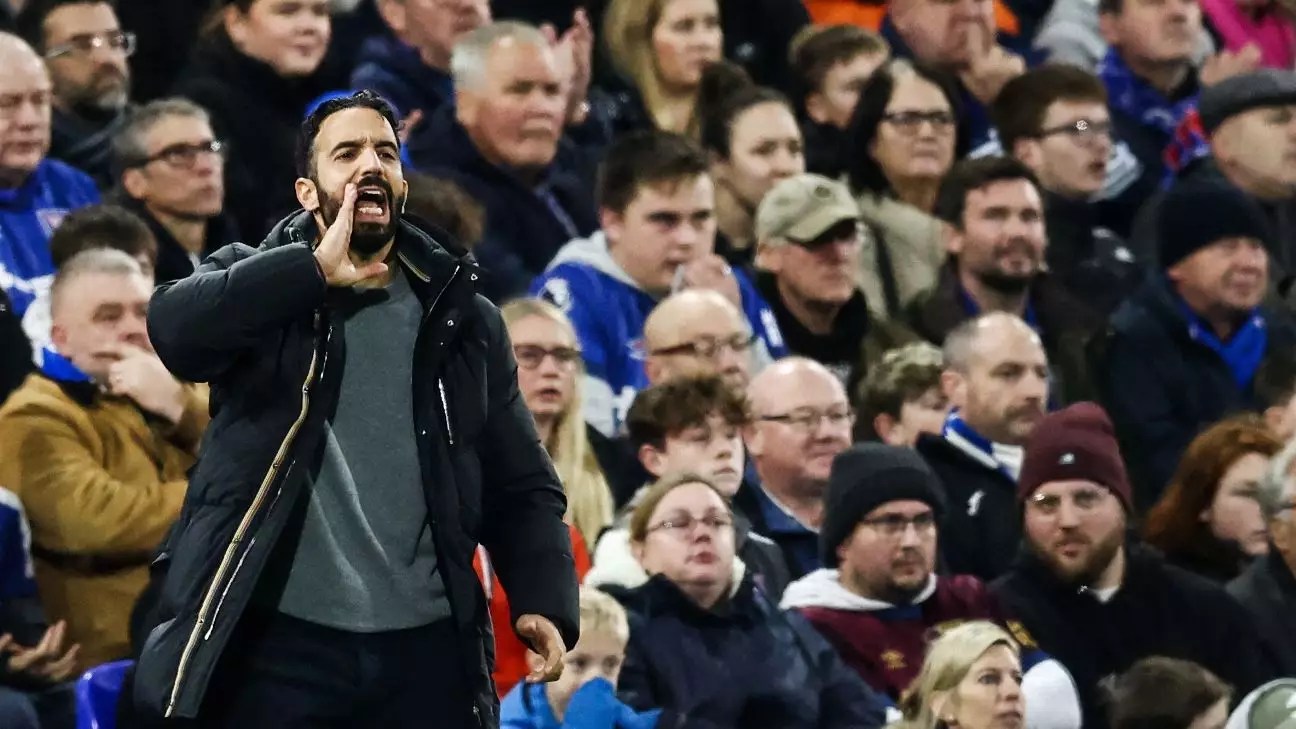The atmosphere was electric as Ruben Amorim made his managerial debut for Manchester United, facing off against Ipswich Town. Joy erupted in the first moments of the match when Marcus Rashford, often seen as a symbol of the club’s recent struggles, found the back of the net just two minutes in. This early success was a beacon of hope, promising a turnaround for a team that has grappled with underperformance in recent years. However, within a mere 81 seconds of jubilation, the facade of optimism began to crack as reality set in.
Despite the thrilling start, the match concluded in a disappointing 1-1 draw. Amorim’s initial excitement quickly turned to frustration as the team let its lead slip away. Omari Hutchinson’s stunning equalizer just before halftime exposed the defensive frailties still haunting the Red Devils. This experience highlighted the monumental challenge facing Amorim, who has entered the storied halls of Old Trafford with the colossal task of restoring the club’s former glory.
While his previous success with Sporting CP sparked hope among fans, the reality at United was markedly different. Amorim’s visible agitation, particularly as he chastised Joshua Zirkzee for failing to exhibit urgency, underscored the deeper malaise running through the squad. When a substitute needs to be reminded of the importance of attacking in stoppage time, it paints a grim picture of the mental state of the players.
The match revealed critical weaknesses that Amorim must urgently address. The squad’s performance raised questions about their fitness levels, tactical understanding, and overall mental resilience. When asked about the players’ mindset, Amorim noted that they seemed “too stuck,” indicating a lack of confidence and decisiveness that has plagued the club for too long. This fear, deeply rooted in their recent form, represents a significant barrier to progress.
Playing with a 3-4-2-1 formation, which had brought previously successful results, Amorim’s strategy was compromised by a lack of available players. Injuries depleted his defensive options, forcing him to utilize makeshift lineups that ultimately lacked cohesion. Relying on experienced players such as Casemiro and Christian Eriksen, both past their prime, further spotlighted the squad’s limitations. The lack of youthful energy in critical areas of the pitch allowed Ipswich to dominate, highlighting the urgent need for a tactical and personnel revamp.
Despite the frustrations expressed in the draw at Portman Road, there remain glimmers of hope for Amorim’s tenure at United. The initial signs of understanding among players regarding their roles and responsibilities are a step in the right direction. However, transformation will not happen overnight; it requires time, nurturance, and strategic planning.
Amorim’s acknowledgment of the challenges ahead—to instill a winning mentality in a team so long accustomed to losing—is a crucial mindset for supporters to accept. He spoke candidly about needing to adapt the players physically and mentally to his methods, a sentiment that aligns with the fans’ expectations for progress, albeit perhaps slower than they would hope.
The shadow of Erik ten Hag looms large over Amorim’s early reign. His predecessor’s inability to galvanize the team casts a long shadow, making Amorim’s endeavor all the more daunting. Yet, both the fanbase and the board have shown their willingness to invest in Amorim as a man to elevate United back to its former prestige. The banner greeting him at Portman Road, urging him to “Make Our Team Great Again,” reflects a yearning for revival, a sentiment that resonates with a fanbase hungry for success.
Amorim understands that real change involves both short- and long-term strategies. Some players may not fit the mold of his vision, necessitating future transfer market interventions to build a more dynamic, energetic side. Moreover, he must motivate the existing players, instilling confidence and tenacity so they can shed the shackles of defeatist mentality that has plagued them.
While Amorim’s debut lacked the fireworks that could have marked the start of a bright new era, it nevertheless exposed the realities he must confront in rebuilding Manchester United. Challenges abound, but commitment to self-improvement, adaptability, and a strong footballing philosophy can ultimately lead to success—a journey that, while fraught with difficulty, could reignite the Red Devils’ once-cherished winning culture.


Leave a Reply